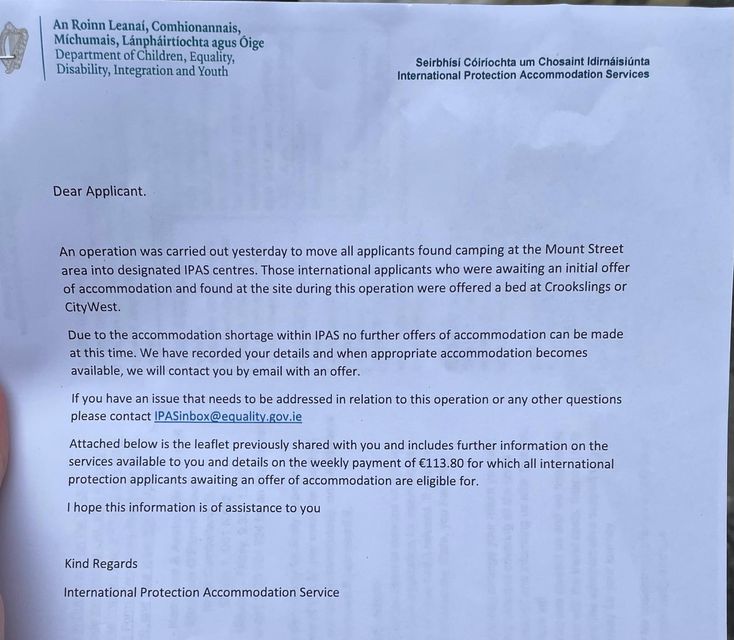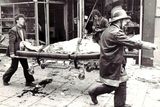Fresh drive to buy up properties for asylum-seekers as up to 100 migrants on Mount St told no beds available
Up to 100 asylum-seekers outside IPAS office on Mount St told no accommodation availableGovernment launches drive to buy and rent empty properties to house asylum-seekersWorking nursing homes, student accommodation and social housing will not be consideredTaoiseach insists no gardaí will be sent to the Border after Sunak demands ‘urgent clarification’‘Tent city’ cleared on Dublin’s Mount StreetAsylum applicants left to wander the streets last night after being turned away at International Protection OfficeAontú leader Peadar Toibin labels plan to buy or rent more properties as “seriously ill advised”.
Gardai remove 200 asylum seekers from Mount Street on coaches
The Government has launched a drive to buy or rent empty properties from landlords, developers and builders to help house record numbers of asylum-seekers.
The Department of Integration is looking for buildings that either need extensive renovation or are in usable condition. A tender for expressions of interest has been put out. Currently working nursing homes, student accommodation, housing earmarked for social housing or accommodation planned “for use by other arms of Government” will not be considered. The properties offered must have over 150 bed spaces.
It comes as up to 100 asylum-seekers who gathered outside the International Protection Accommodation Services (IPAS) office on Mount Street in Dublin have been told there is no accommodation available for them today. They were given details of homeless services.
Letters issued to International Protection applicants say: "Due to the accommodation shortage within IPAS no further offers of accommodation can be made at this time”
The letter says that their details have been taken and any offer of accommodation will be made by email where appropriate. RTÉ reported that gardaí told the men they must disperse. The office is now closed.
A major operation was undertaken in Dublin yesterday to move hundreds of asylum-seekers who had been sleeping in a large encampment of tents around the IPAS centre.
An asylum-seeker from Pakistan, who has a disability, told the Irish Independent he has nowhere to go tonight.
“Yesterday I came here but I still don’t have accommodation and food,” he said.
“Because I have a disability, I fear more about myself now.” He said they “know nothing” and “don’t know what’s happening”.
"We still do not have any idea where we are going tonight,” he added.
Salim Dkhlalaa said he arrived in Ireland in February.
“Today I came down to get a blue card (Temporary Residence Certificate).”
Salim, who lost his wallet two days ago, said he also has nowhere to go.
Letters were circulated to those gathered on Mount Street today
Another man outside the IPAS office said he had been living in the tents on Mount Street for four months.
“They moved the tents. I have nowhere to sleep,” he added.
Meanwhile, the Department of Integration has put out a tender to builders, developers, landlords and property owners for vacant housing which could be turned into asylum seeker accommodation. The tender was formally issued earlier this week.
Buildings which are planned, with full planning permission but are “not built” will be considered; as well as those which need renovations and those in turnkey condition are listed in the tender.
Among the requirements listed as “desirable” but are not mandatory include self catering; space for shop; space for ancillary services which may be medical or education; office space; indoor space for recreation; outdoor space for gardens, playgrounds, or basketball courts; as well as parking and spaces for buses or delivery trucks.
The tender also says the buildings can be in a populated area or with easy access to nearest populated area via public transport. They also may have easy access to shops and GPs either by foot or public transport. These are not listed as mandatory criteria.
Builders, developers and property owners have until the end of April 2025 to to put forward their expressions of interest.
A government source acknowledged there were “very severe challenges” in accommodating men seeking international protection.
The new tender reads: “The department is seeking expressions of interest from property owners, private developers and building contractors who are interested in selling or leasing: existing properties/buildings in turnkey condition; existing properties that require upgrading/refurbishment/renovation.
“All properties acquired through this expression-of-interest process will be to provide accommodation for international protection (IP) applicants and must be on the terms of vacant possession.”
Read more
Aontú leader Peadar Toibin labelled the plan to buy or rent more properties as “seriously ill advised”.
“The State is the biggest hoarder of empty homes in the country. This government is completely and utterly incompetent when it comes to housing and accommodation,” he said.
The move comes at a time of unprecedented demand for homes on the private market amid a shortage of supply for buyers. The Government is also considering cutting social welfare rates for all Ukrainians who are here already.
There are only 1,184 permanent State-owned beds for international protection applicants.
The Government wants to increase this to 13,000 under long-term plans to accommodate asylum-seekers.
Currently, there are more than 20,800 beds for asylum-seekers in emergency accommodation and an additional 6,173 permanent beds, both on a commercial basis.
Separately, it has emerged that gardaí will arrest asylum-seekers who return to pitch tents in the city centre, but only if they commit a criminal offence such as trespass or a public order offence.
“Arrests will be made when there is a legal basis for it – there was two arrests made yesterday, for example,” a source said.
“The big issue in the Dublin 2 area where the tents were located were criminal complaints of trespassing in relation to public and private entities – any complaint made to An Garda Síochána will be fully investigated.”
Early yesterday, the operation got under way on Mount Street to move up to 200 asylum-seekers to facilities at Citywest and Crooksling.
A total of 60 international protection applicants were transported last night from Crooksling, Co Dublin, to the Co Wicklow site at River Lodge, also known as Trudder House, in Newtownmountkennedy.
The HSE-owned site has been the scene of protests in recent weeks after local people opposed plans to house asylum-seekers there.
Government sources said gardaí would be asked to ensure camps do not return to the city.
New asylum-seekers began arriving at the International Protection Office (IPO) on Mount Street after lunchtime yesterday, just hours after the controversial “tent city” around it had been dismantled.
A group of about 50 asylum applicants remained in a holding area at the entrance to the office by the time it closed at 6pm yesterday, and scuffles broke out as some of them could then not board a bus to take them to accommodation.
They were told there was no accommodation for the night, that the office was closed and they could come back in the morning.
Among them was 30-year-old Imran Nasir from Afghanistan, who told the Irish Independent he had been sleeping in a tent on Mount Street, but after spending a night on a friend’s couch he arrived on Wednesday morning to find his tent had been taken away.
“My tent is gone so I will have to wander the streets. I might go to the park and sleep there,” he said.
Taoiseach Simon Harris has said the situation on Mount Street had become “completely unacceptable”.
He thanked the state agencies involved in the removal of the ‘tent city’.
In a statement, he said: “The international protection applicants have been taken to safe shelter with appropriate sanitary facilities, hot food, a clean place to eat, access to medical help and a bus link to Dublin city centre.
“The laws of our land must always be upheld, and we cannot have unsafe and illegal encampments in our cities or towns.”
Separately, UK prime minister Rishi Sunak urged the Irish Government not to send gardaí into border areas amid a row over asylum-seekers crossing from the North into the Republic.
Mr Sunak said Dublin “must uphold its promises” to avoid a hard border on the island of Ireland and avoid setting up checkpoints to prevent asylum-seekers entering the country.
Diplomatic tensions between London and Dublin increased in recent days after Justice Minister Helen McEntee claimed there had been an upsurge in asylum-seekers crossing the Border following the passing of the UK’s Safety of Rwanda Act.
Answering questions in the House of Commons, Mr Sunak said ministers were seeking “urgent clarification that there will be no disruption or police checkpoints at or near the Border” and that there must not be “cherry-picking of important international agreements”.
The Taoiseach later confirmed no gardaí would be sent to border areas.
Asked whether the UK government had sought clarification from Dublin that there would be no police checkpoints at the Border, Mr Harris said: “I have no idea, but of course there won’t be."
The UK’s Northern Ireland Secretary Chris Heaton-Harris later yesterday held a phone call with Tánaiste Micheál Martin during which the Tánaiste reiterated that no gardaí were being sent to the Border.
In a statement following the “constructive” call, Mr Heaton-Harris said: “The Tánaiste confirmed that there will be no deployment of officers from An Garda Síochána (Irish police) to the Northern Ireland/Ireland border and that the Irish Government shared a steadfast commitment to securing the external border of the Common Travel Area.”
Another focal point of the diplomatic row centred on Dublin passing emergency legislation to deem the UK as a “safe country” for the return of asylum seekers.
Both governments have acknowledged the existence of an “operational agreement” which provides for the reciprocal return of asylum seekers between the UK and Ireland, but Downing Street has said it contains no legal obligations to accept them.
In a softening of language, the statement from the Northern Ireland Office on Wednesday concluded: “The Secretary of State reiterated that the UK will not accept any readmissions or returns arrangements that are not in our interest.”
Sinn Féin housing spokesperson Eoin Ó Broin said a better stream of emergency temporary accommodation is also required to deal with the large numbers of international protection applicants who are currently without housing.
“People should not be sleeping on the streets,” he told RTÉ Radio One’s Morning Ireland on Thursday. “The concerns many people have is that the Government doesn’t have an actual plan to provide a particular State-led provision of good quality, temporary accommodation and therefore they’re flailing about.”
Mr Ó Broin said engagement with local communities is crucial and those concerns around a coherent plan are the core of the issues, though there are some “bad faith actors or people on the far-right who are agitating”.
“Nobody choses to sleep in a tent. If we had a proper, functioning international protection system where people were treated in a fair, efficient and enforced manner, we wouldn’t have ever had those kinds of scenes,” he said.
He said the solution to the situation on Mount Street is to provide an adequate accommodation response where applicants can stay while their application is being assessed.
“What I want is the Government to get their act together and not say things which are clearly for the public optics,” Mr Ó Broin added.
Read more
Join the Irish Independent WhatsApp channel
Stay up to date with all the latest news















